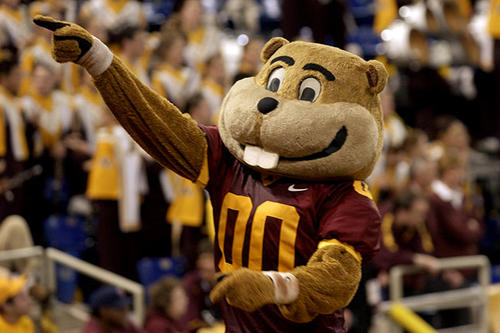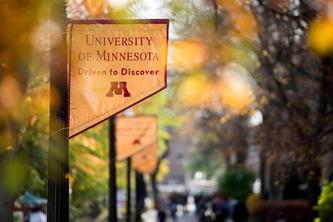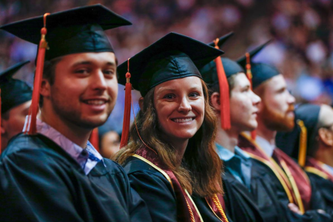
More than 466,000 University of Minnesota Twin Cities alumni continue to make an impact at their alma mater and across the world.
New ways in which alumni are engaging with the University in 2015-16 were outlined by University of Minnesota Alumni Association (UMAA) President and CEO Lisa Lewis in her annual report to the Board of Regents at its meeting today.
“Whether helping to recruit students, supporting the U at the Legislature or giving back of time, talent or treasure, alumni are truly ambassadors for the institution,” said Lewis, entering her fourth year leading UMAA. “Our alumni are a huge asset, make a profound impact on our mission and we are actively finding ways to best serve them.”
Among the new opportunities this year:
- A series of outreach events, called Minnesota Sparks, to bring researchers tackling the state’s most critical issues into conversation with communities across Greater Minnesota. These events support the Board and President’s goals of further statewide engagement and were a partnership among the UMAA, President’s Office, University Relations, U of M Extension and others. Three initial events in Red Wing, Mountain Iron and Brainerd were successful and three more are planned this fall in Fergus Falls, Marshall and St. Cloud.
- More than 100 alumni serving as student recruitment ambassadors in seven states, in partnership with the Office of Admissions. Through one-on-one conversations, alumni share their U of M experience with prospective students and answer questions.
- Enhanced career support via webinars, virtual networking and establishment of corporate networks to engage U alumni in the workforce and highlight how they are leading and contributing to the local and regional economy. Networks exist at Best Buy, US Bank Target and more are planned.
During the last year, more than 44,000 UMTC alumni donated more than $167 million to the U and contributed to a 1,000 percent increase in the number of emails sent to legislators supporting University priorities.
Lewis also announced Gen. Clara Adams-Ender (M.S. ’69) (Ret.) as the Grand Marshal for this year’s Homecoming parade, October 22. You can read more about Adams-Ender, who earned a Nursing degree, in a Minnesota Magazine profile.
Long-term vision for the Twin Cities campus
The Board approved a resolution that allows the University to continue advancing long-term plans for health sciences and student housing needs, the goals of which are not mutually exclusive.
Both plans include phased approaches for a number of options over decades as resources are available. The focus will be on redevelopment of existing facilities and land in the core academic areas of campus, with strategic acquisition of land on the edges for patient and visitor focused uses.
In support of this vision, and the recently approved enrollment plan calling for a modest increase in undergraduate enrollment on the Twin Cities campus over the next five years, the Board discussed two student housing investment proposals.
First, Master Lease Agreements with apartment complexes adjacent to campus were approved. These strategic opportunities will help achieve enrollment plan goals related to second-year students, providing a total of 920 beds. The University will provide many of the supports found in traditional residence halls, such as community advisors on each floor. The complexes to be leased are Radius at 15th, located at 701 15th Ave. S.E. (772 beds), and Keeler Apartments, located at 317 17th Ave. S.E. (164 beds). The leases will be valid for five years, beginning in August 2017, and will total approximately $8 million annually, funded through room and board fees.
Second, Regents reviewed multiple options regarding the future of historic Pioneer Hall and the addition of a consolidated dining facility in the Superblock — a highly desirable, first-year focused neighborhood consisting of four residence halls (Pioneer, Centennial, Frontier and Territorial) adjacent to the heart of the East Bank campus. For nearly 90 years, thousands of students have called Pioneer home. However, the building — which currently houses close to 700 first-year students, a 190-seat dining facility and limited student support spaces — is in need of significant improvements. More detail on these proposals can be found in this press release, as well as committee docket materials.
Together, the new dining facility and a renovated Pioneer Hall will match the experience offered in the U’s popular 17th Avenue Residence Hall, which opened in 2013. Room and board fees will fund the costs of both projects, which align with the proposed vision for long-term development of the Twin Cities campus. The Board is expected to act on an investment in Pioneer in September.
M Health
The Board voted today to terminate the letter of intent (LOI) to create an academic health system with Fairview Health Services and University of Minnesota Physicians (UMP).
The LOI, including key principles for the new system, was passed by the Regents and the boards of UMP and Fairview last October, and negotiations continued to create definitive agreements. The current proposal, which the University and UMP believe is fair for all parties, strengthens the academic mission to benefit patients, the community and the state. However, this proposal has not yet been accepted by Fairview.
“We continue to believe that we are close to a deal and that our vision of an integrated academic health system is the right one for our community and the University,” said U President Eric Kaler. “We would like to see this vision advance. However, at this point, we feel we have come as far as possible. Regardless of what happens with this current effort, Fairview will remain a critical partner. Our existing University of Minnesota Health agreements are in effect, and we will continue to partner in the Clinics and Surgery Center, to advance medical education and research and provide exceptional health care to our patients and our communities.”
More information about this decision can be found on the Health Sciences website.
Kaler: A “commendable” leader
In its annual performance review of president, the Board found that during the past year President Eric Kaler continued to perform at a high level, maintaining relentless energy and enthusiasm for the University. Across several important measures, the University is delivering on its mission. The review also notes that Kaler is committed to confronting challenges and moving the institution forward.
The Board also:
reviewed metrics included in the University Progress Card, a robust tool used to track progress on high-level institutional goals that was approved by the Board in October 2015. The University is on track in nearly all goal areas, including decreasing median student debt and increasing 4-year graduation rates for Pell-eligible students.
received an update on the Rochester campus’ strategic plan. Chancellor Stephen Lehmkuhle outlined key campus accomplishments and future planning. This is the fourth and final in a series of presentations from system campus leaders. Future action based on the four presentations is expected.
Read President Eric Kaler’s report to the Board here.
Following today’s meeting, Regents will hold their annual planning retreat. The Board will meet again Sept. 8-9.
- Categories:
- Campus Affairs





